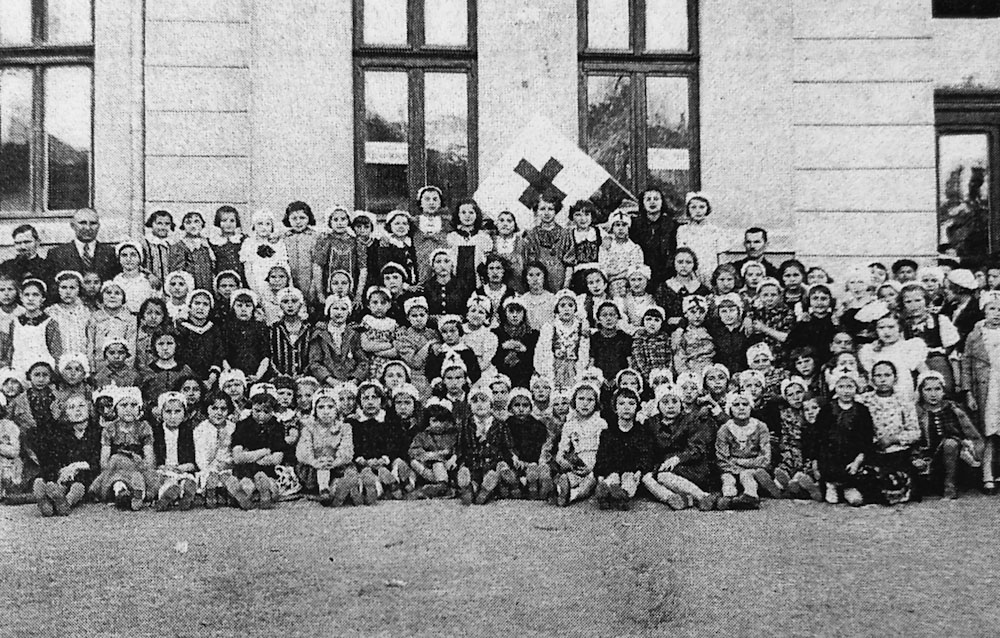
The building was built by the Traders’ Society as part of the Guildhall complex.
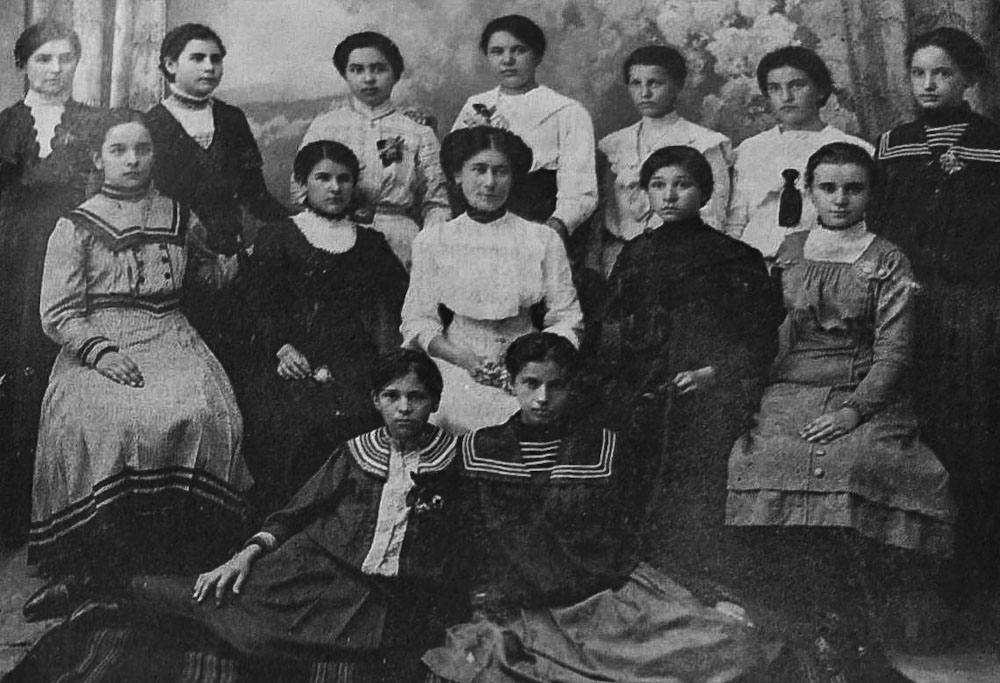
State School for Girls was open in Zaječar, as one of three first schools for girls founded in Serbia. At the beginning, all classes were taughts by a teacher and school principle, Mrs. Stana Hermanović.
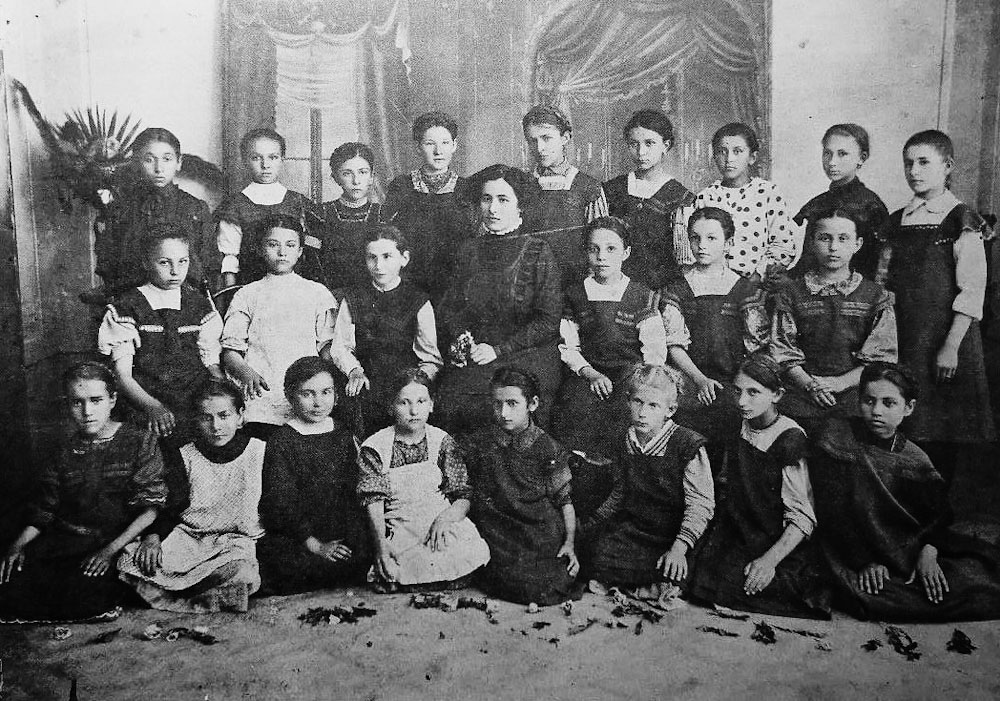
The Private Incomplete Girl’s Gymnasium was founded with the mathematics professor, Radoslav Lazarević, as a principle.
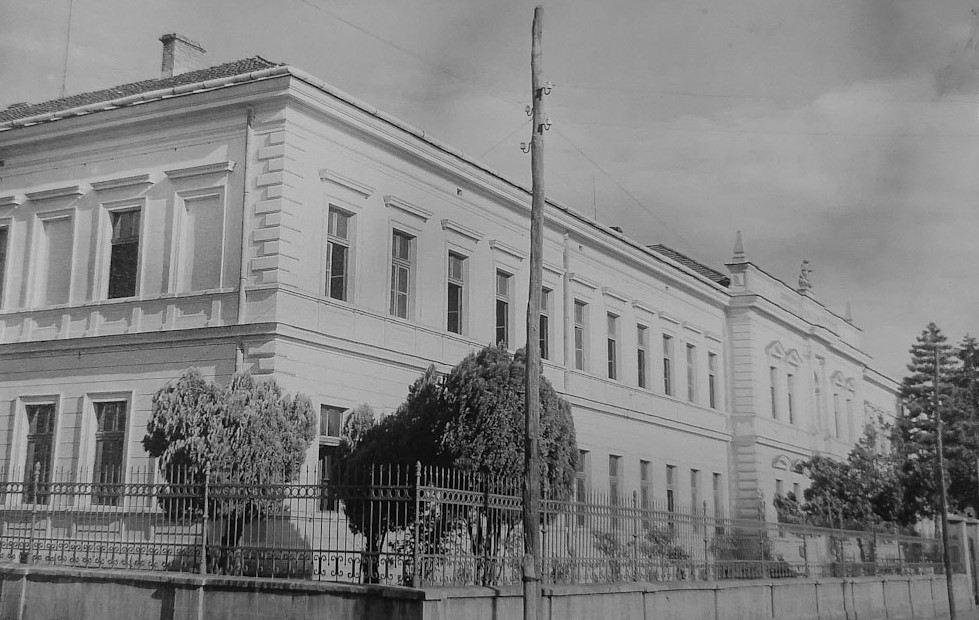
On Septembar 2nd and the introduction of coeducation of boys and girls the Private Girls’ Gymnasium seazed to exist and all students enrolled to the regular gymnasium.
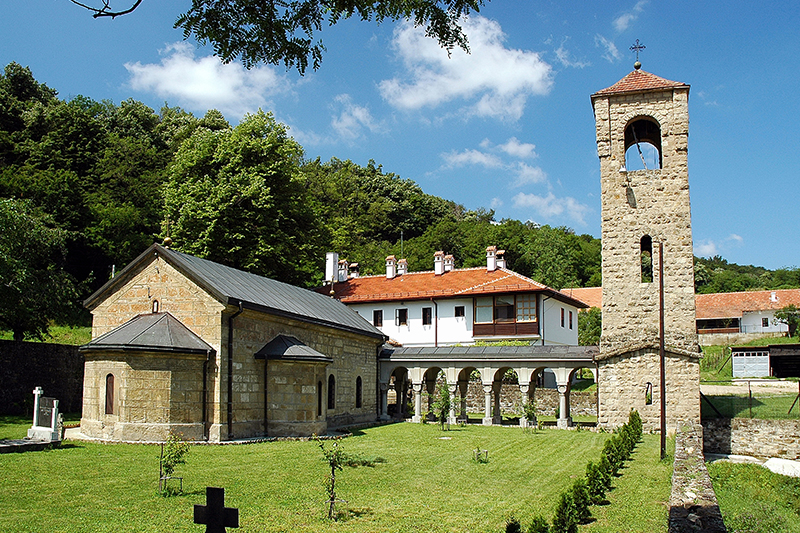
The kindergarden begun to work in this building for which the Municipality provided the electricity, Đorđe Genčić briquettes for the heating, while the brotherhood of Bukovo Monastery gave monthly financial support. Parallel to this, before World War II, there was a private kindergarten for the immigrant children, organized and led by the pastor from the Catholic Church.
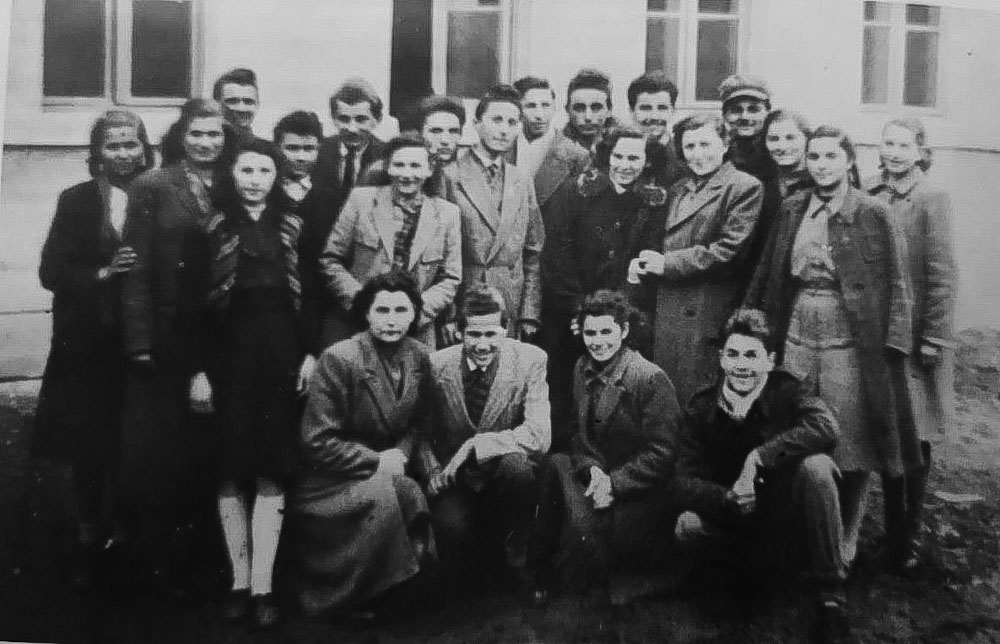
During its first year of existence, the School for Medical Assistants was located at this building. Also, until 1953. High School for Economics held its classes at the building.
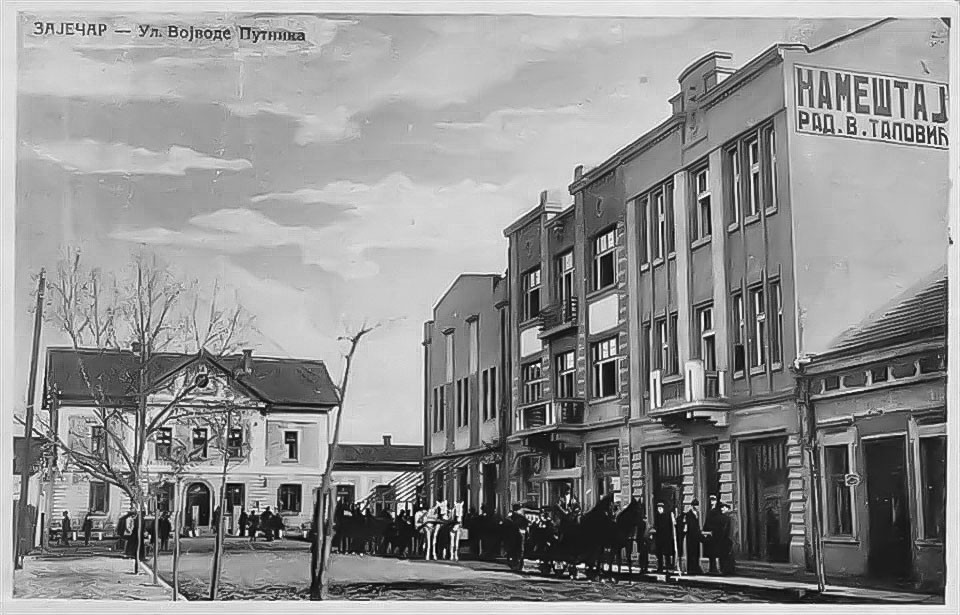
The Lower Music School was founded, with departments for piano, violin, and cello, and prof. Božidar Holas as a principle. The school was temporary located at the former Craftsmen House, next to the Main Train Station.
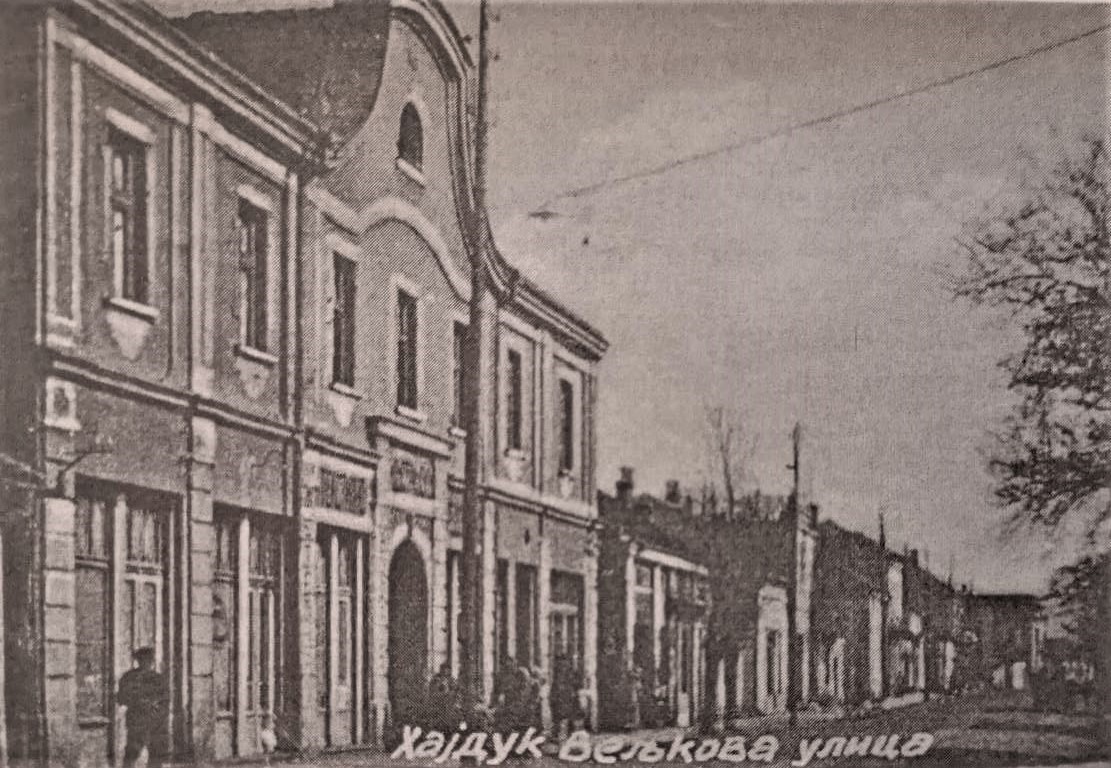
Music school relocated to a former kafana building at Hajduk Veljko Street no.5.
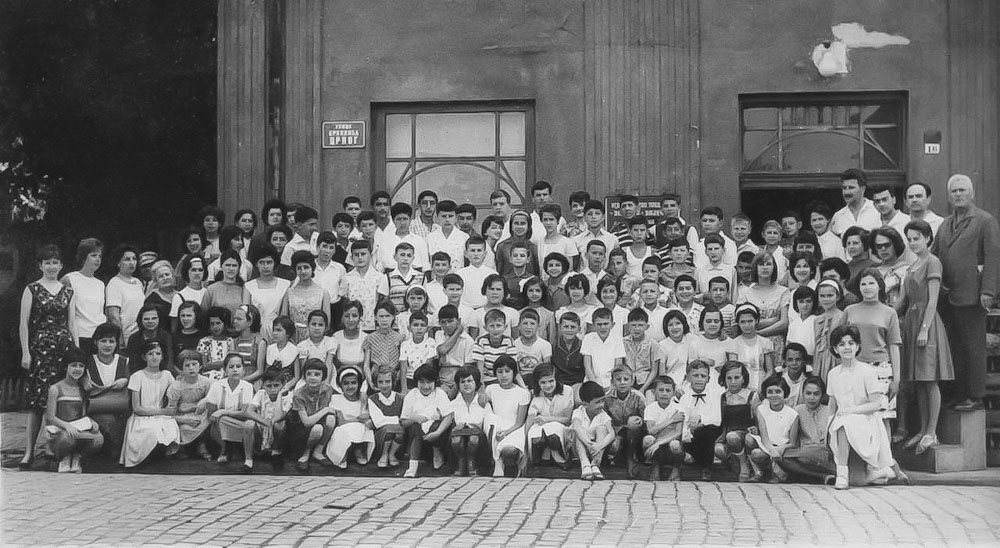
Music school returned to former building next to the train station and violinist Vladislav Hiršl becomes its principle.
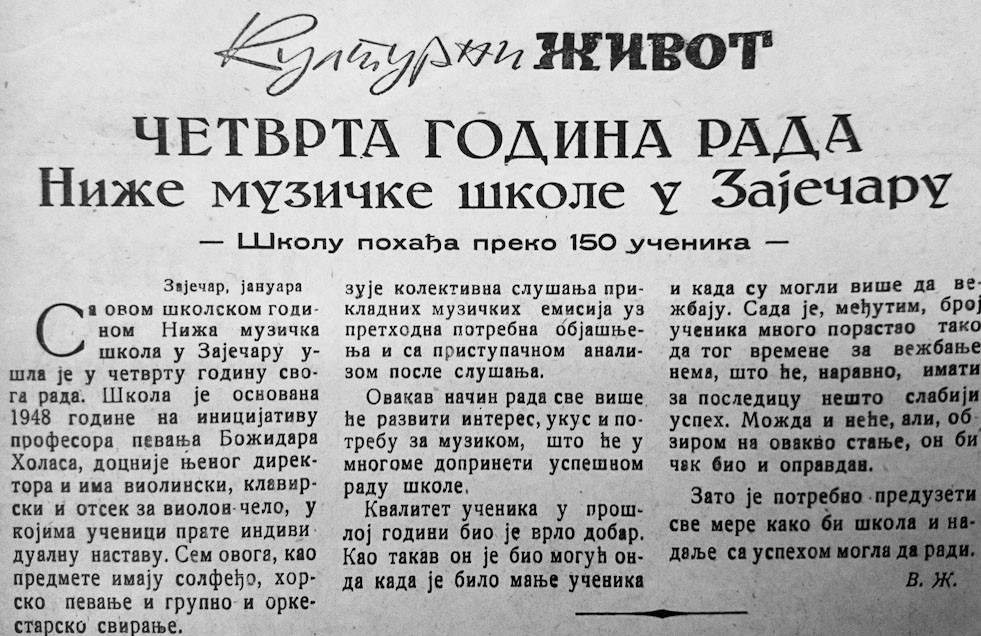
Friends of Music Society was founded by the music school and which contributed in promoting music and raised music education to a new quality level.
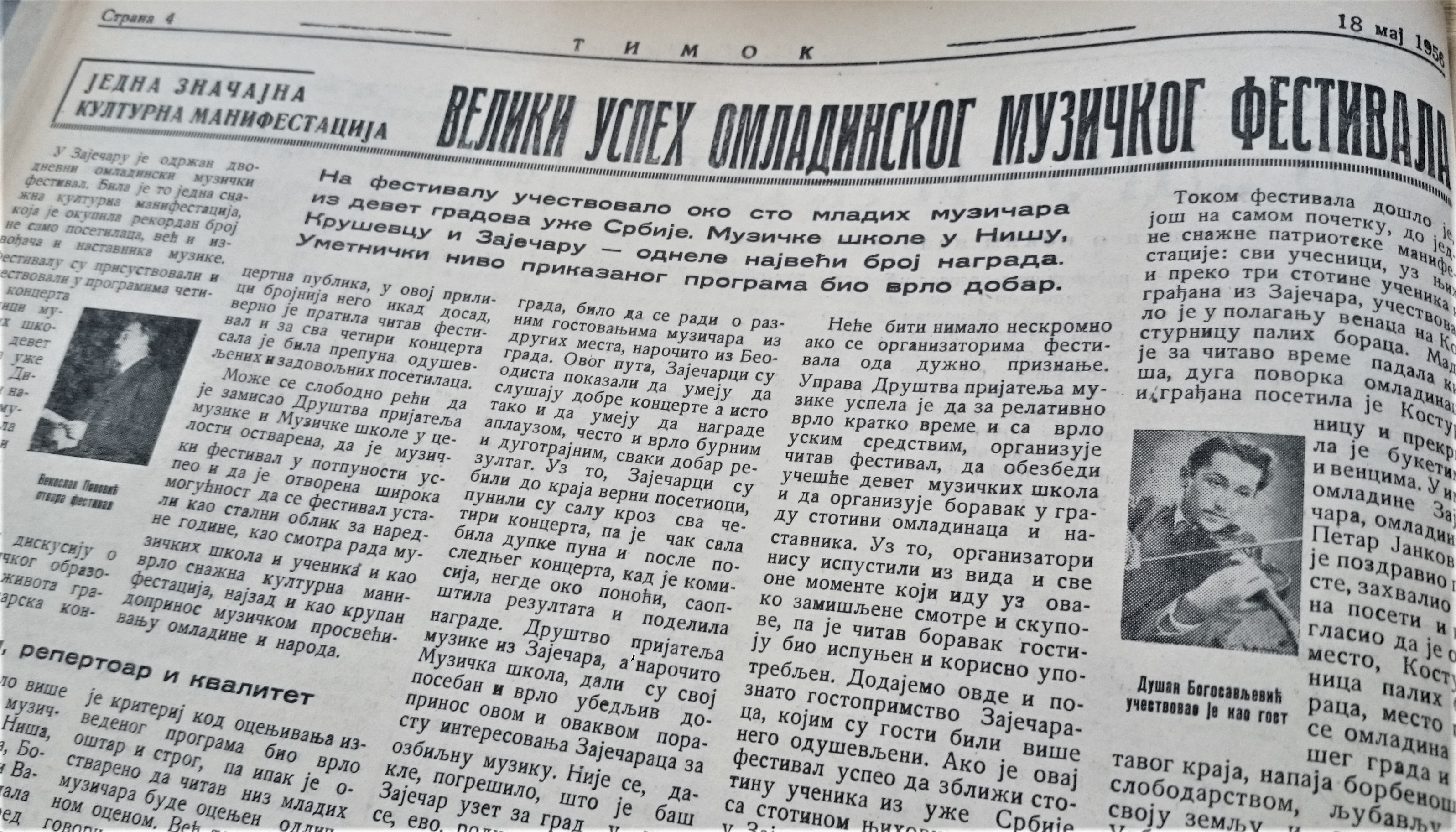
The first Youth Music Festival, a festival of music school of Serbia was organized in Zaječar.
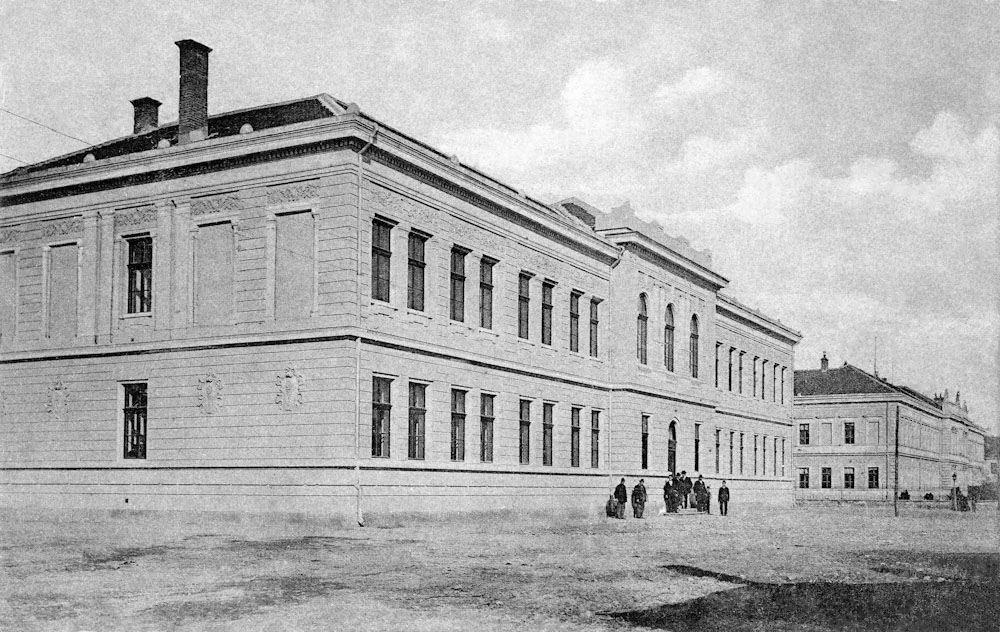
The first special class was introduced in the primary school “Milenko Brković Crni” for children with physical or mental difficulties and challenges. This class was a kernel from which the future special school developed.
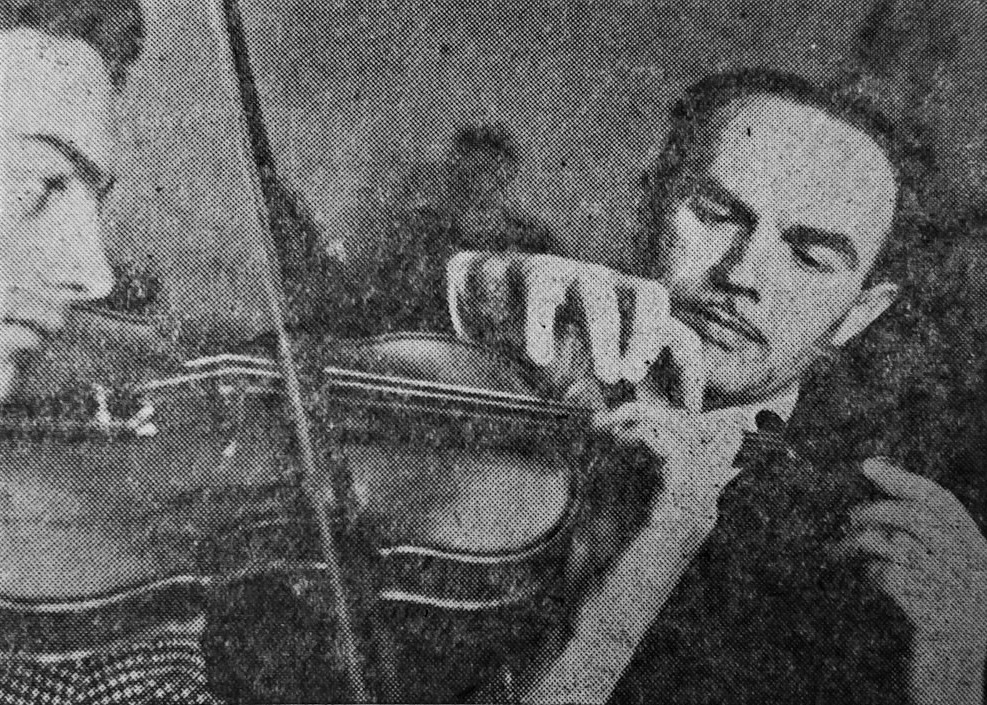
Mini Festival of Yugoslav Music Schools was held in Zaječar.
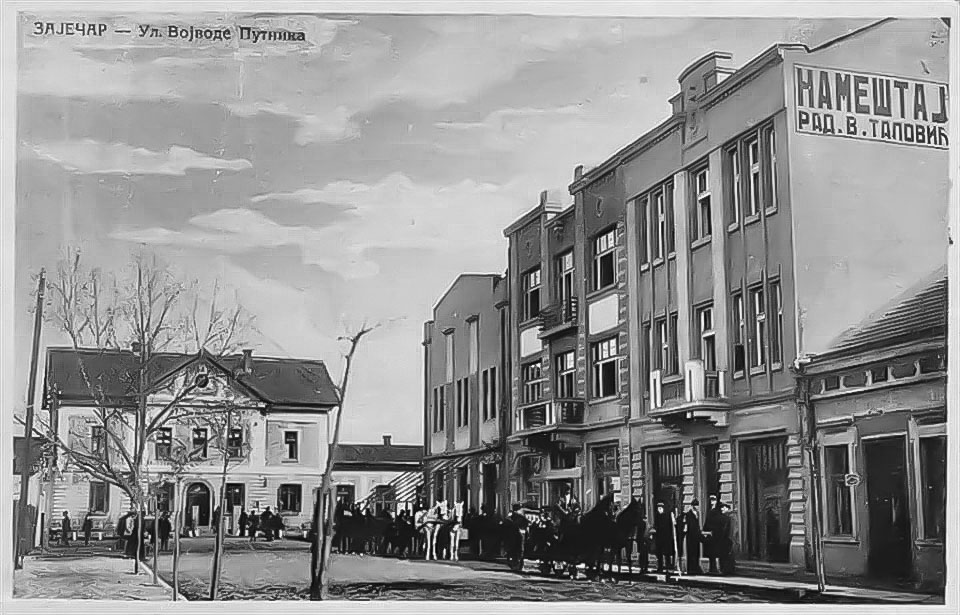
On June 1st the fire broke out at the building next door and the music school lost all its furniture and library.
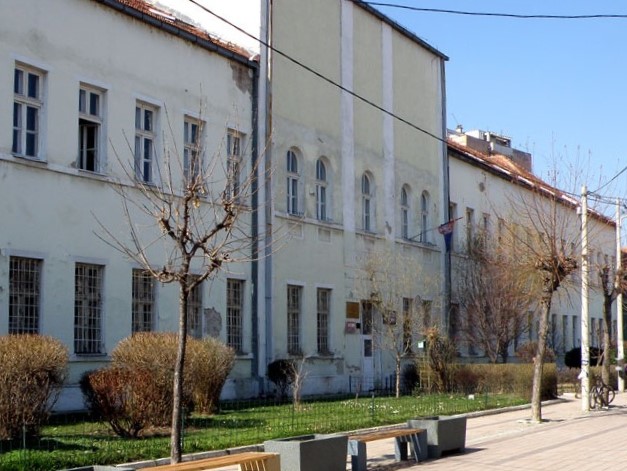
Special Primary School was founded on April 14th. After renovating and adapting the former girls’ school building, 69 pupils got enrolled in 5 classes.
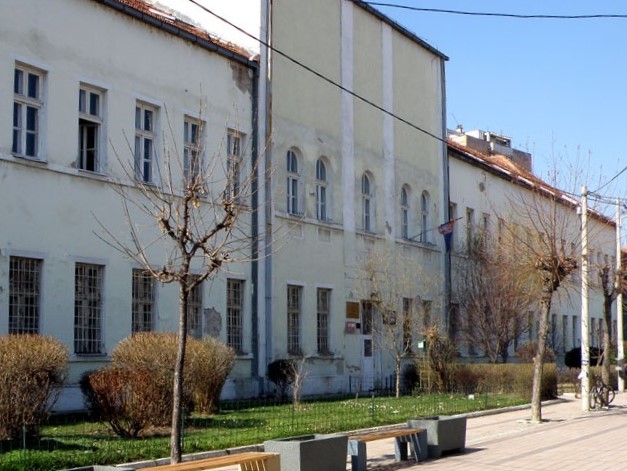
Together with the Special Primary School “Jelena Majstorović”, the music school moved into the renovated building of the former Girls’ Primary School where it still remains today.
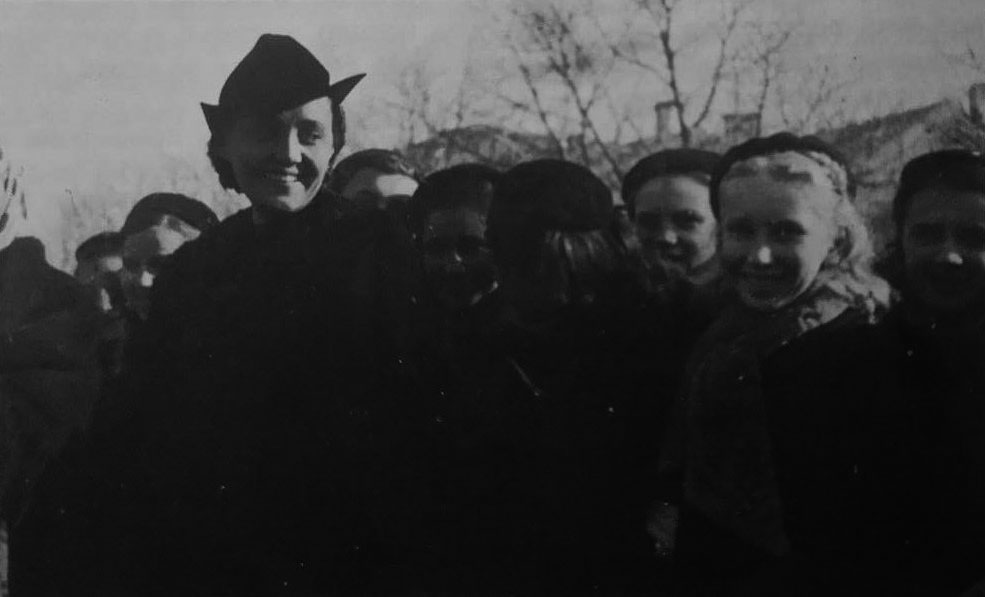
The school was named after the former progressive Gymnasium professor Jelena Majstorović (1907-1944) who was killed by the chetniks during World War II.
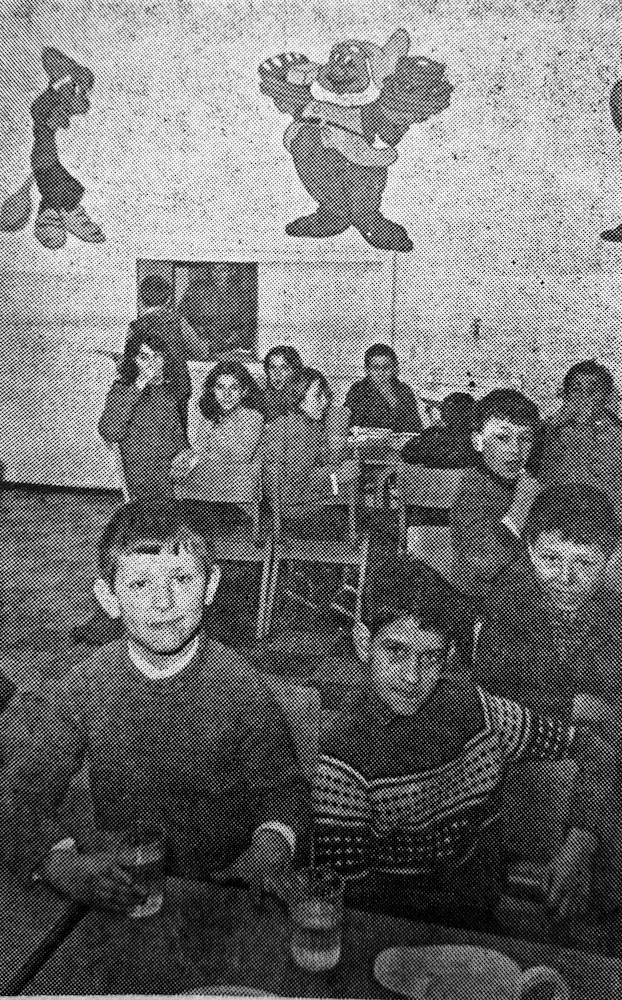
The boarding school was open for all children coming outside of Zaječar, after the renovation of the separate building in the backyard.
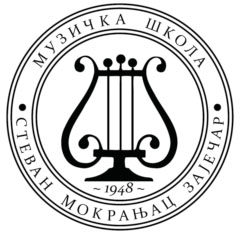
The Lower Music School changed name into Primary School of Music Education “Stevan Mokranjac”. Simultaneously, the school fees were abolished, previously paid by the parents. After Vlasislav Hiršl retired, Aleksandar Mišić became the principle.
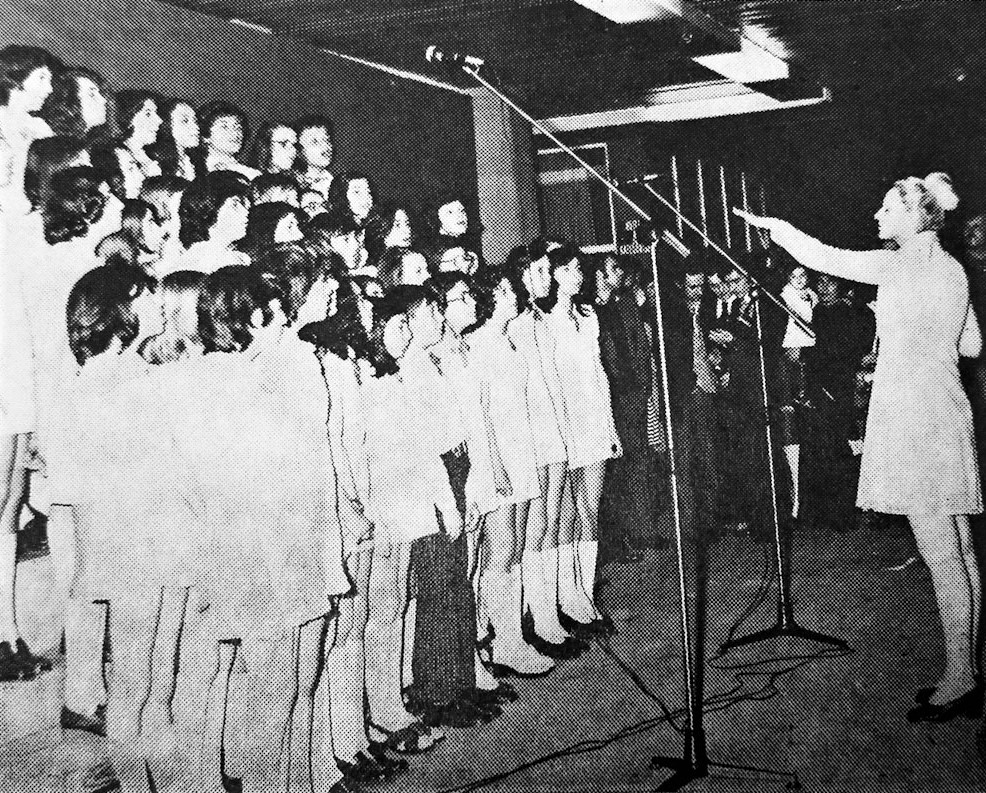
Girls’ Choir was founded, led by the teacher Nadežda – Nada Malenović, who also conducted the Children’s Choir. In the following decades, they became two of the most successful choirs in Yugoslavia, winning all major awards and competing internationally.
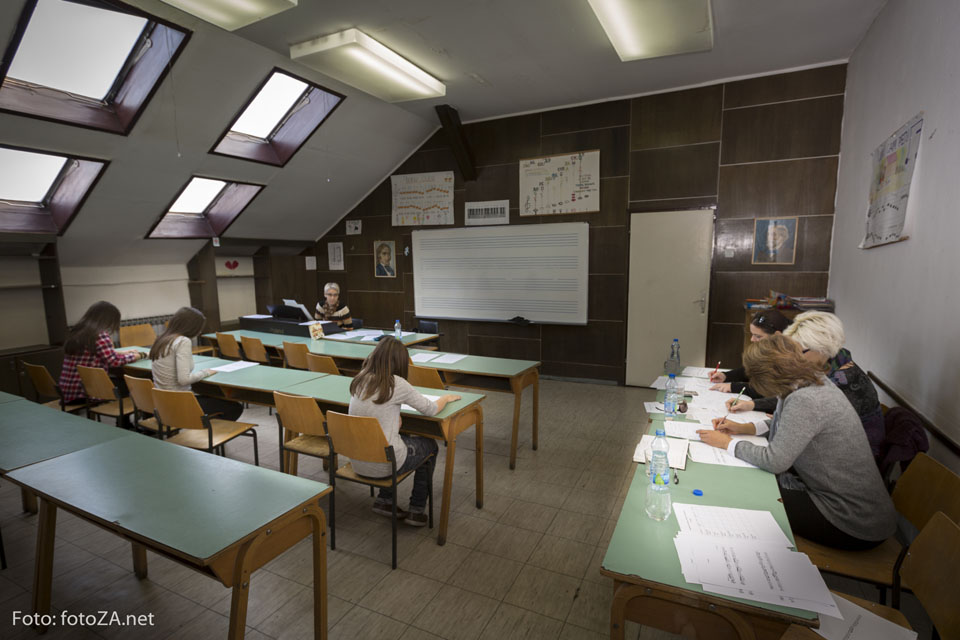
The building was renovated again and had one more floor added to it with new and modern classrooms.
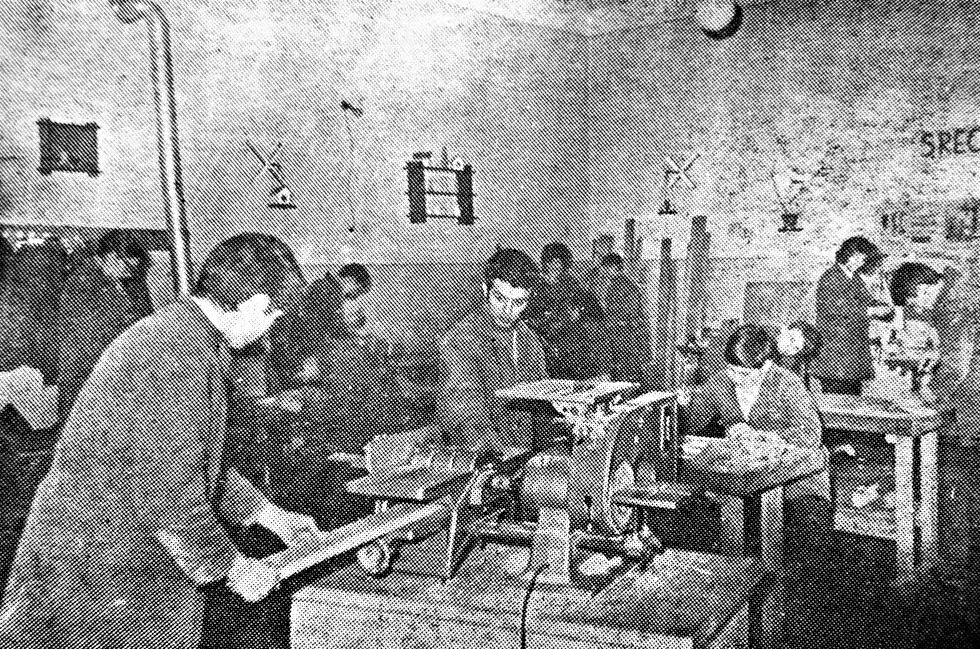
Special High School was open and the first generation of students enrolled into programs specialized in: mechanical engineering and metal processing, forestry and wood processing, and graphic arts. Textile and leather processing were introduced in the educational program of the Special High School two years later.
1898 – GIRLS’ PRIMARY SCHOOL
1906–1912 PRIVATE GIRLS’ GYMNASIUM
1948–1953 HIGH SCHOOL OF ECONOMICS
1948–1949 SCHOOL FOR MEDICAL ASSISTANTS
1968 – SCHOOL FOR PRIMARY AND HIGH-SCHOOL EDUCATION “JELENA MAJSTOROVIĆ” AND PRIMARY MUSIC SCHOOL “STEVAN MOKRANJAC”
As part of the Guildhall complex, the building was erected in 1897 by the Traders’ Society which gave it away as a gift to Zaječar Municipality to provide space needed for girls’ education. Next seventy years, the building changed many tenants, pupils and students, as well as kindergartens.
In 1898 three schools for girls were founded in Serbia – in Šabac, Niš, and Zaječar. Since his arrival to Zaječar in 1891 bishop Milentije Vujić was a great promoter of girls’ emancipation. This resulted in Zaječar being one of the three towns where schools for girls were open. In the beginning, one teacher and school principle taught all classes – Mrs. Stana Hermanović. The school program was the same as in the boys’ school with an addition of handicraft. Although it had only three grades, the school was rated as a lower gymnasium, and after completing it, the pupils were able to enter into the fifth year of general gymnasium.
The need to educate girls was greater each year, and by an official decree in 1906 the Private Incomplete Girls’ Gymnasium was founded. All teachers had faculty level of education and the school had four grades. As a private school, it was supported by the fees, while all additional support was provided by frequent public concerts prepared by the girls. The principal of the school was Radoslav Lazarević, a professor of mathematics.
The government closed down the Private Girls’ Gymnasium on September 2, 1912 and all girls were ordered to enroll into the boys’ gymnasium. This way, the coeducation was officially introduced in Zaječar gymnasium.
In the last years of 1920s the kindergarten opened in this building, for which the Municipality provided the electricity, Đorđe Genčić briquettes for the heating, while the brotherhood of Bukovo Monastery gave monthly financial support. Parallel to this, there was a private kindergarten for the immigrant children, organized and led by the pastor from the Catholic Church.
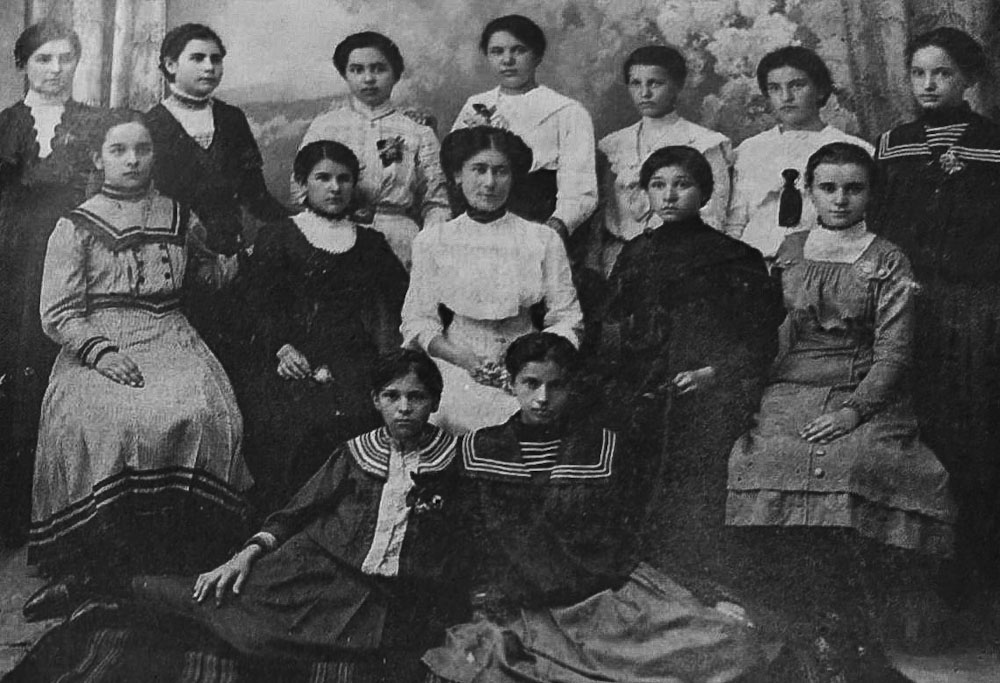
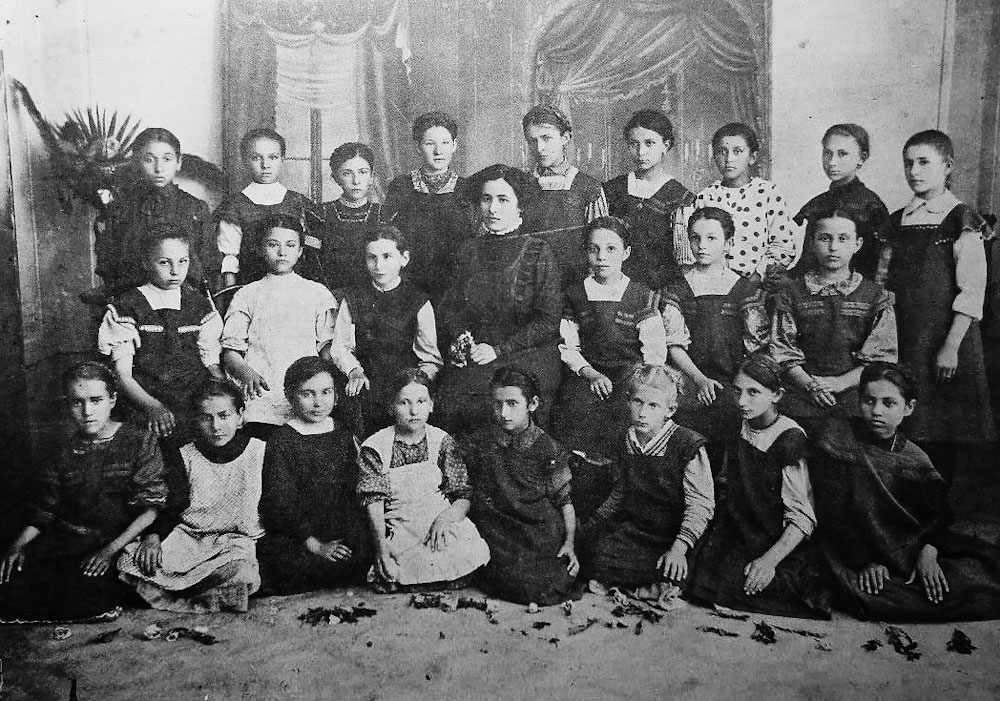
SCHOOL FOR PRIMARY AND HIGH-SCHOOL EDUCATION “JELENA MAJSTOROVIĆ”
In 1958/59 school year a first special class was introduced in the primary school “Milenko Brković Crni” for children with physical or mental difficulties and challenges. This class was a kernel from which the future special school developed. One by one, more and more special classes were added each year in all primary schools in Zaječar, and during this first decade there were 187 pupils educated. In 1967 the Society for the Help to Mentally Challenged Persons was founded, and the City Council signed a decision on April 14, 1968 to open a special primary school. After renovating and adapting the former girls’ school building, 69 pupils got enrolled in 5 classes in 1968.
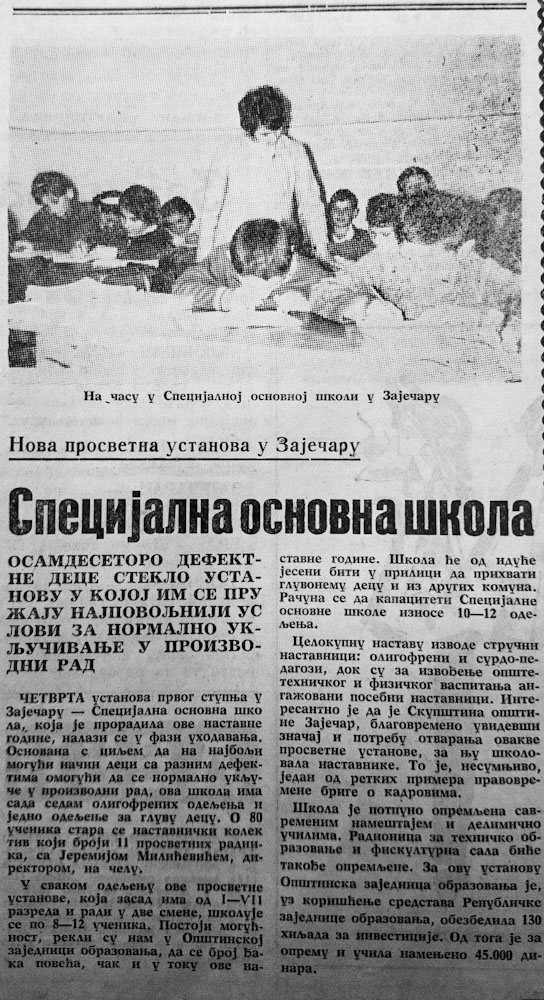
Since May 1970 the school carries the name of the former progressive Gymnasium professor Jelena Majstorović (1907-1944). Born in Zaječar where she completed primary school and the gymnasium, she graduated at the Faculty of Philosophy in Belgrade. Jelena returned to her hometown where she taught in the Gymnasium from 1931 to 1944. She also taught Serbian language and literature at Girls’ Crafts School. On June 28th, 1944 she was killed by the chetniks near the village Ilino, Boljevac Municipality. October 21st, the date when she was appointed a Gymnasium professor, is celebrated every year as School’s Day.
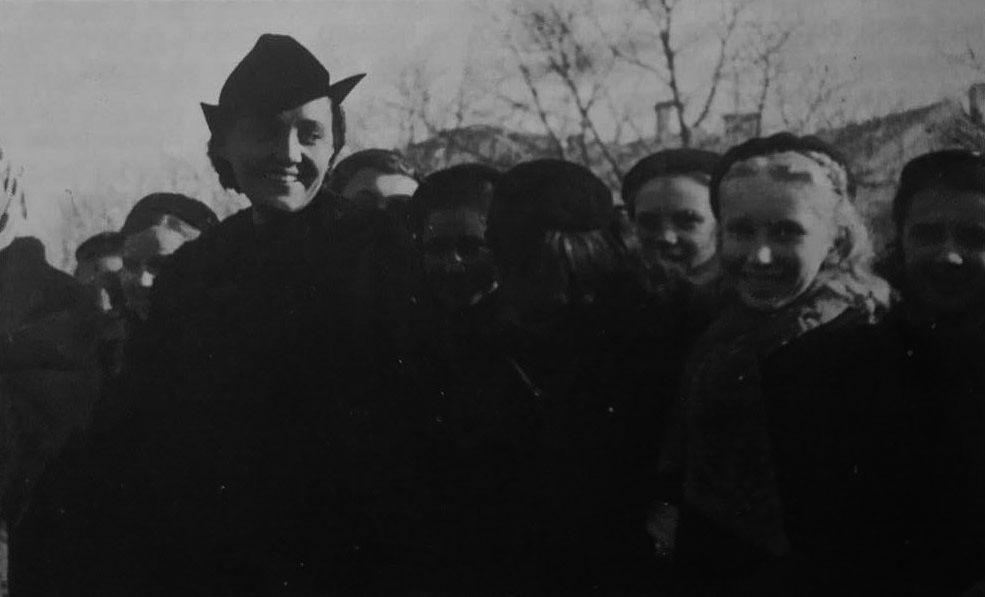
In 1972, after the renovation of the separate building in the backyard, the boarding school was open for all children coming outside of Zaječar, and where pupils are given constant supervision and care. After completion, most of the pupils were granted a job through a special workshop “DES”, or would continue their education in high schools after successfully passed entrance exams.
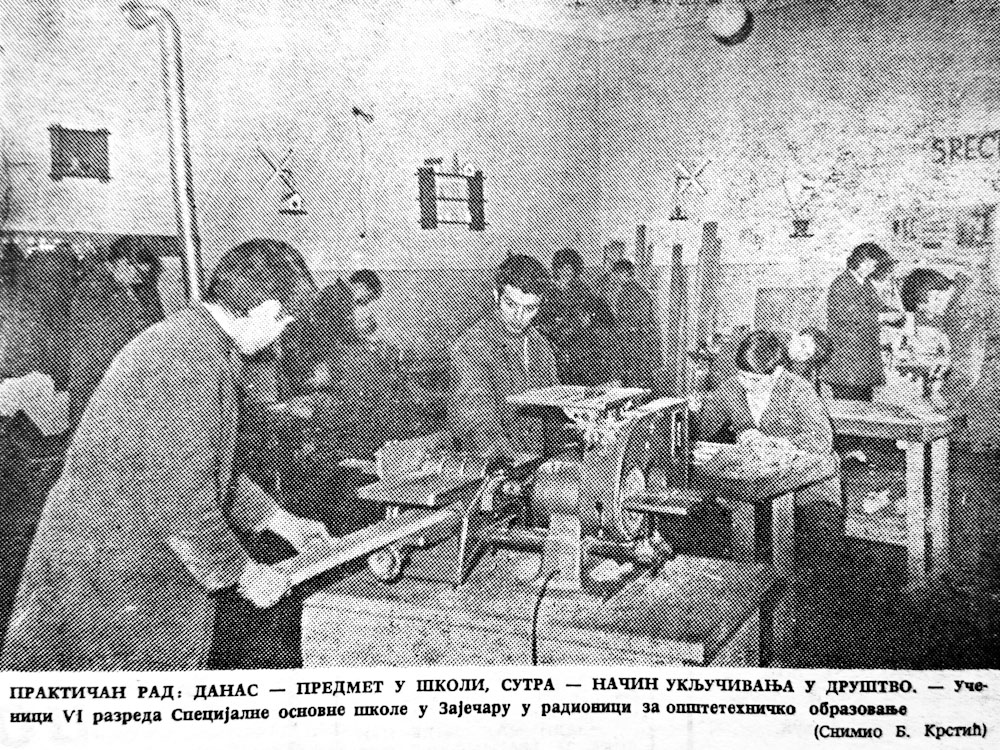
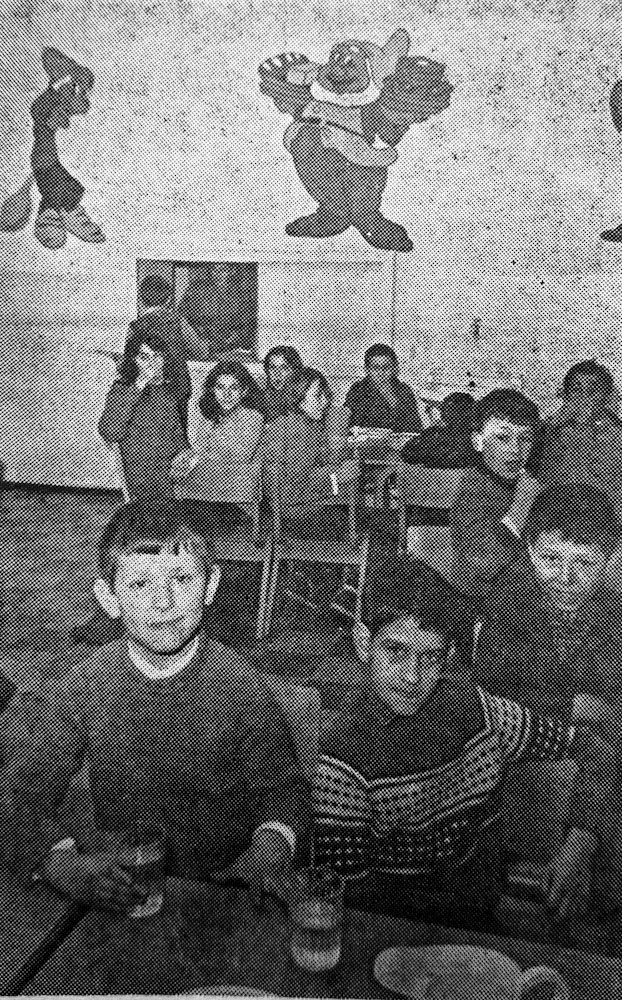
In 1980/81 the building had one more floor added to it and the pupils were given new and modern classrooms. The school followed all innovation introduced by other schools, and organized many extracurricular activities (poetry and theater group, national dances, traffic, technical section, biology, painting, art, handicraft, choir, etc.)
In 1995 the High School was open and the first generation of students enrolled into programs specialized for the following fields: mechanical engineering and metal processing, forestry and wood processing, and graphic arts. They studied theory in the classrooms, while practical education took place at the special workshop “DES” or at the factory “Arsenije Spasić”. Textile and leather processing were introduced in 1997 after the school provided all necessary machines.

PRIMARY MUSIC SCHOOL “STEVAN MOKRANJAC”
On an initiative by the enthusiasts and art lovers, the first primary music school in Zaječar was open after World War II. The Ministry of Education sent an official approval on August 19th, 1948 and the Lower Music School officially begun its work. It had departments for piano, violin, and cello. The Ministry covered the costs for three new pianos, and the news was enthusiastically covered by the main newspaper "Our Life": “The region that gave us Stevan Mokranjac and other excellent musicians, composers and performers, numerous choirs and orchestra, finally has an opportunity to educate young people in a professional manner. The main task of the school will be to grow into a music center that gathers not only its students, but everyone else interested in music, managing all music life of the community.”
The school was opened on September 26th,1948 and its first principal was Božidar Holas, a Gymnasium singing and music professor. His main support came from the following teachers: Vladislav Hiršl (the chief of the Radio Orchestra and a violin teacher), Josip Beran (violin and trumpet teacher), Josip Vošnjak, Sava Kukić (clarinet teacher), Dimitrije Petković (contrabass teacher), and piano teachers Vera Čurašev, Miroslava Tuner, Olivera Jocić and Dušica Petrović.

In the first year, from 249 applicants, 148 passed the entrance exam and enrolled. The school was temporary located in the former building of the Craftsmen House, next to the Main Train Station. It had five rooms: three for individual and one for collective classes, and one office for the teachers and administration. There was also a library with 180 books of specialized literature. Next year, the school was moved to Hajduk-Veljko Street no.5, where a former restaurant was turned into five classrooms, one office, and a small hall. Since all his public calls to provide a decent building for the music school were ignored, the principle Holas resigned and left Zaječar for good at the end of 1951. From 1952 to 1975 the school was led by Vladislav Hiršl who is remembered as a hardworking man and respectful friend of the art of music. The Music School returned to its old building at Brkovića Crnog St. no.14, sharing it with the Cinema “Jadran” and the local Society of Culture and Arts.
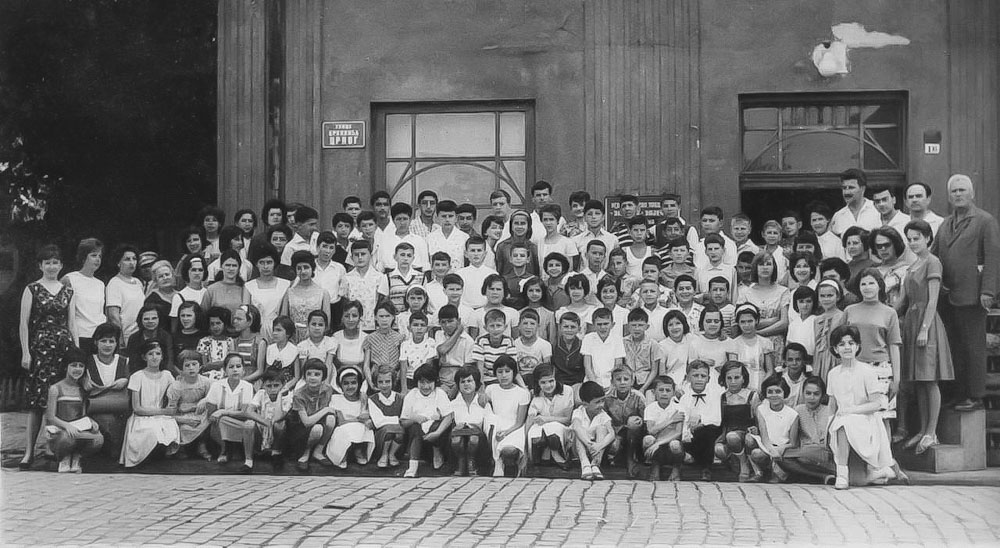
In 1954 the school founded the Society for the Friends of Music which gave a great contribution in promoting music and raising music skills to a new quality level, and it gathered teachers and students, army musicians, etc. The highlight of its success was the organization of the First Festival of Serbian Music Schools entitled Youth Music Festival. It took place on May 12 and 13, 1956 with participants coming from many towns in Serbia. As a celebration of its ten-years of existence, a Mini Festival of Yugoslav Music Schools was held in 1958.
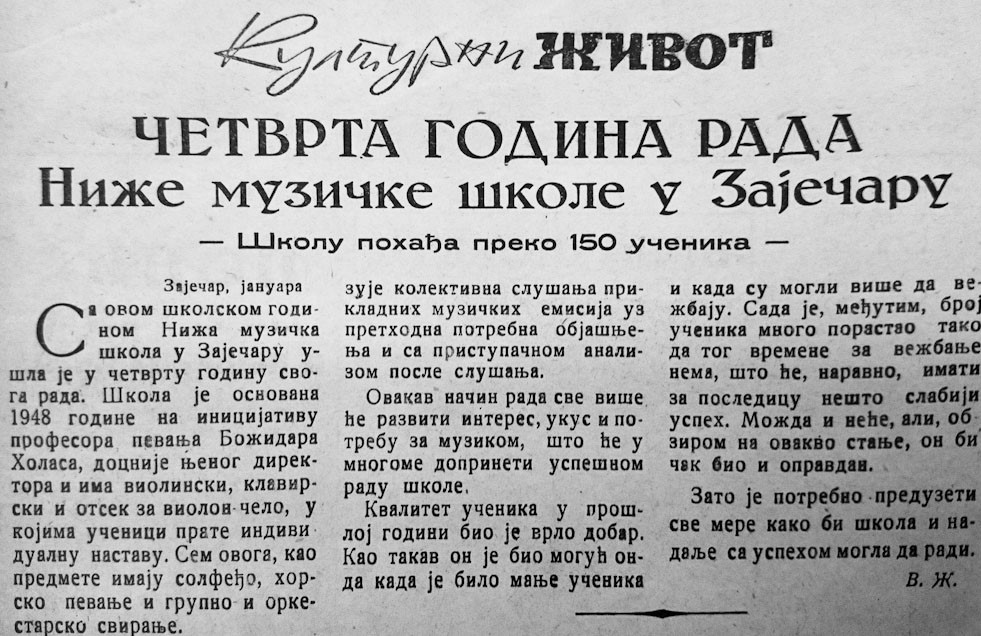
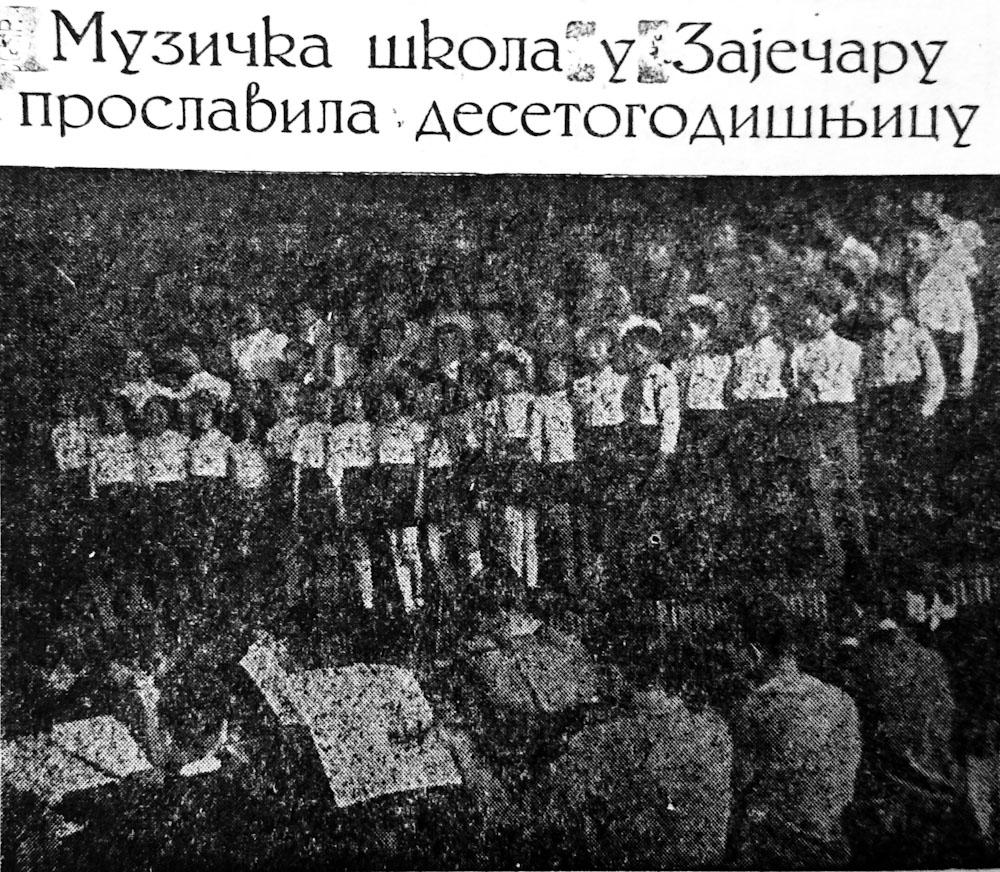
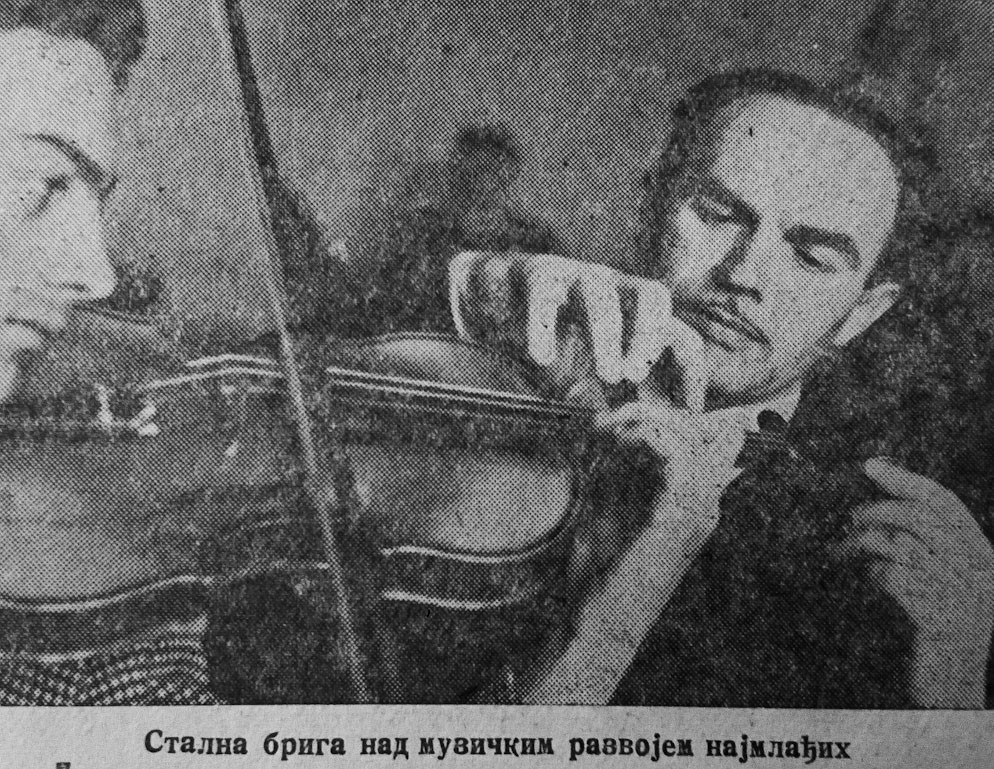
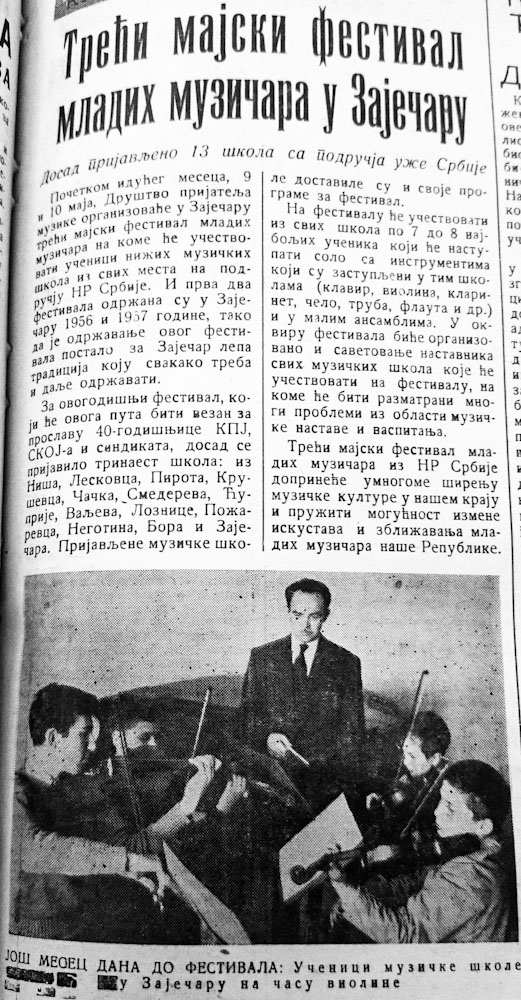
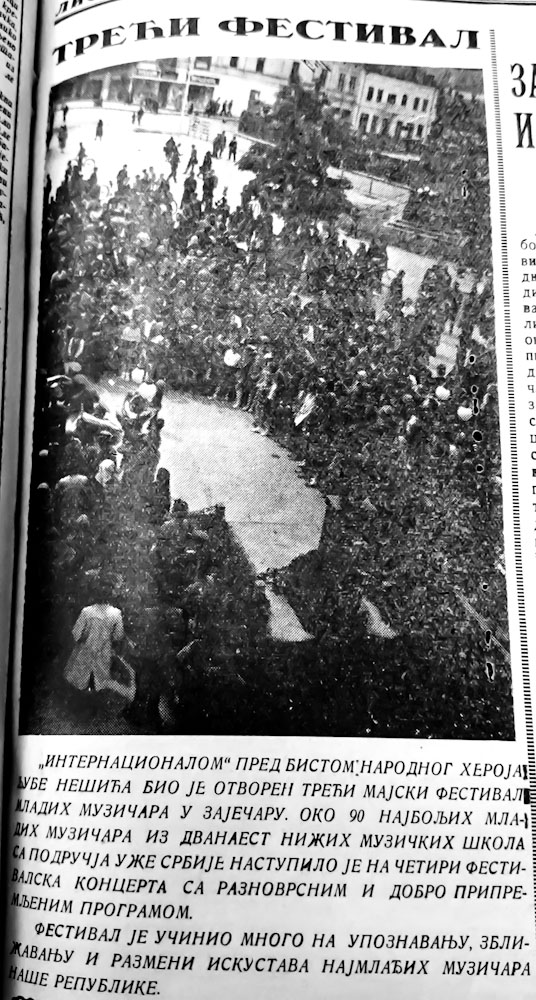
In the fire that took place in the night between June 1 and 2, 1964 the textile factory “Timočanka” was hit, as well as the part of the building where the music school was.All furniture burned down, as well as the library of the music school. The school remained in the building but moved into ten rooms on the first and second floor, without a larger hall for the rehearsals of the choir and the orchestra, or for its public concerts.
In 1966 the renovation of the former Girls’ Primary School begun. The Music School moved in in 1968 together with the Special Primary School “Jelena Majstorović”, finally having a proper space for its students and activities. The addition of the attic floor provided Music School with proper classrooms, as well as a music hall with 200 seats for concerts, public presentations and similar events.
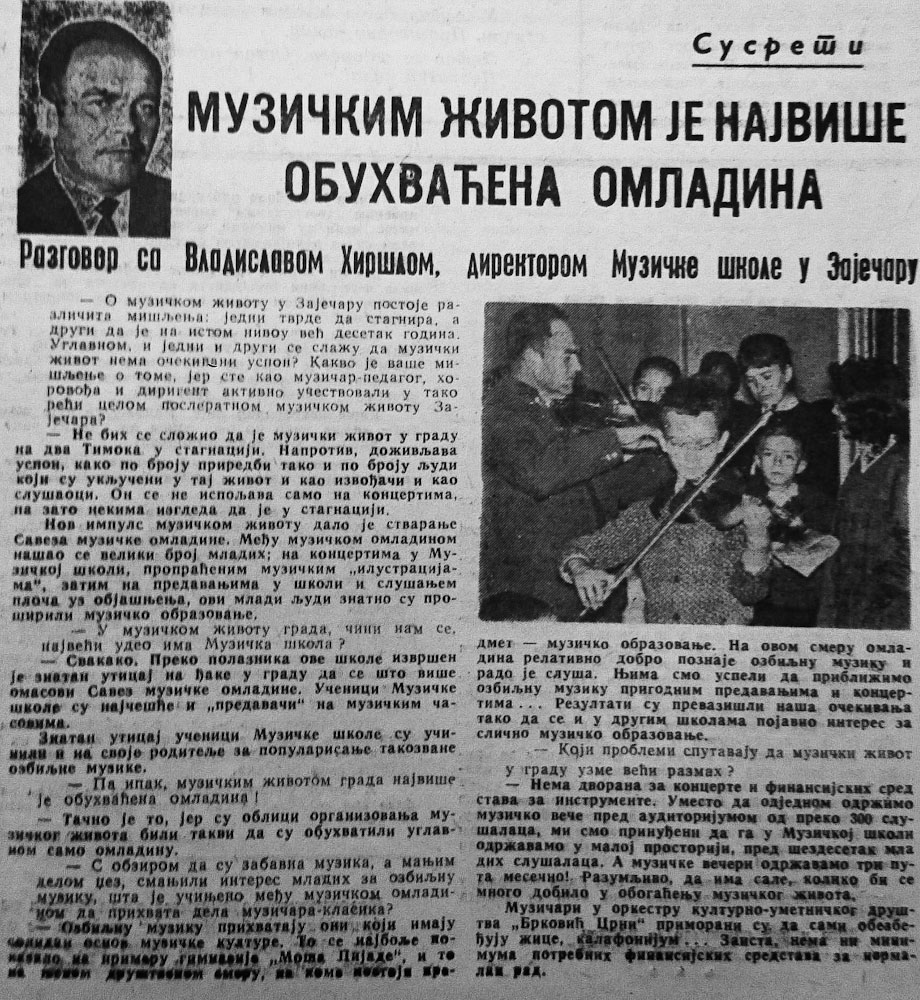
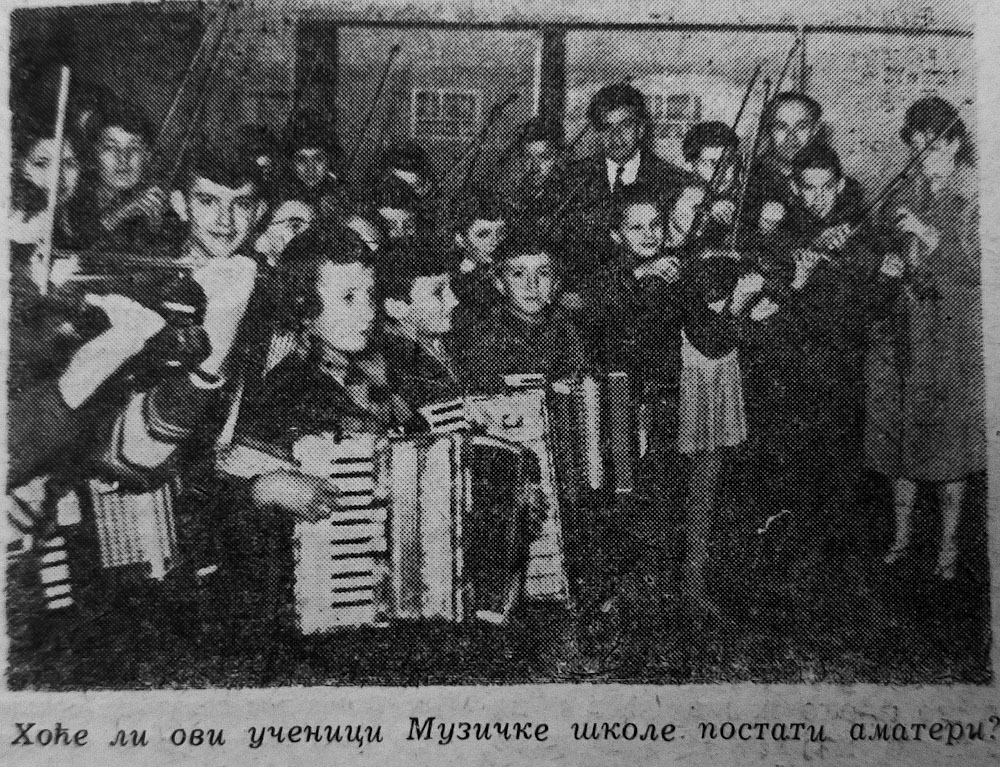
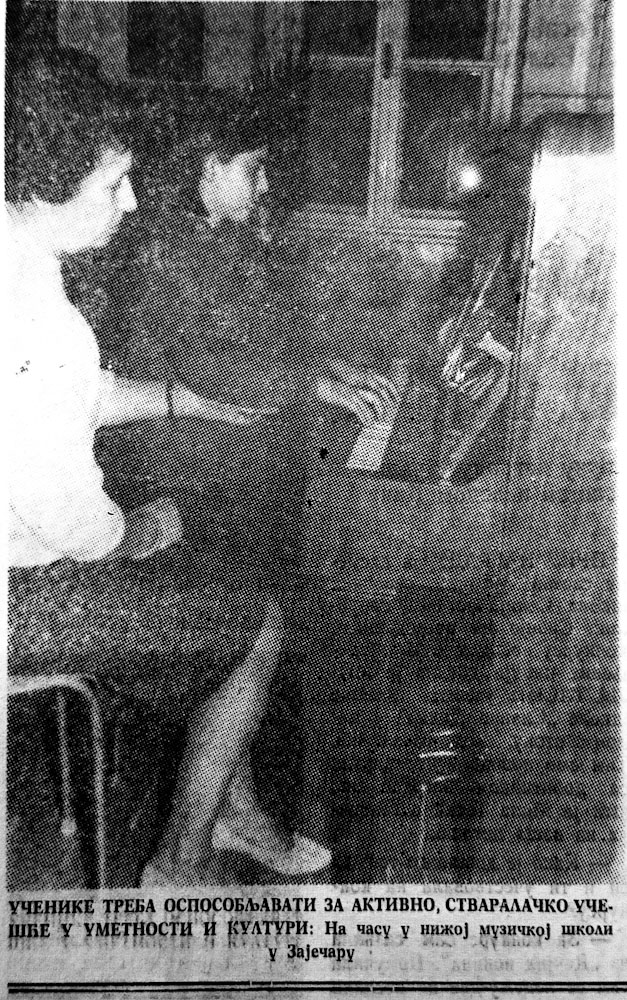
In 1975, following the new Law, the Lower Music School changed name into Primary School of Music Education “Stevan Mokranjac”. Simultaneously, the school fees were abolished, previously paid by the parents. After Vlasislav Hiršl retired, Aleksandar Mišić became the principle. That same year the Girls’ Choir performed for the first time, led by the teacher Nadežda – Nada Malenović, who also conducted the Children’s Choir. In the following decades, they became two of the most successful choirs in Yugoslavia, winning all major awards and competing internationally.
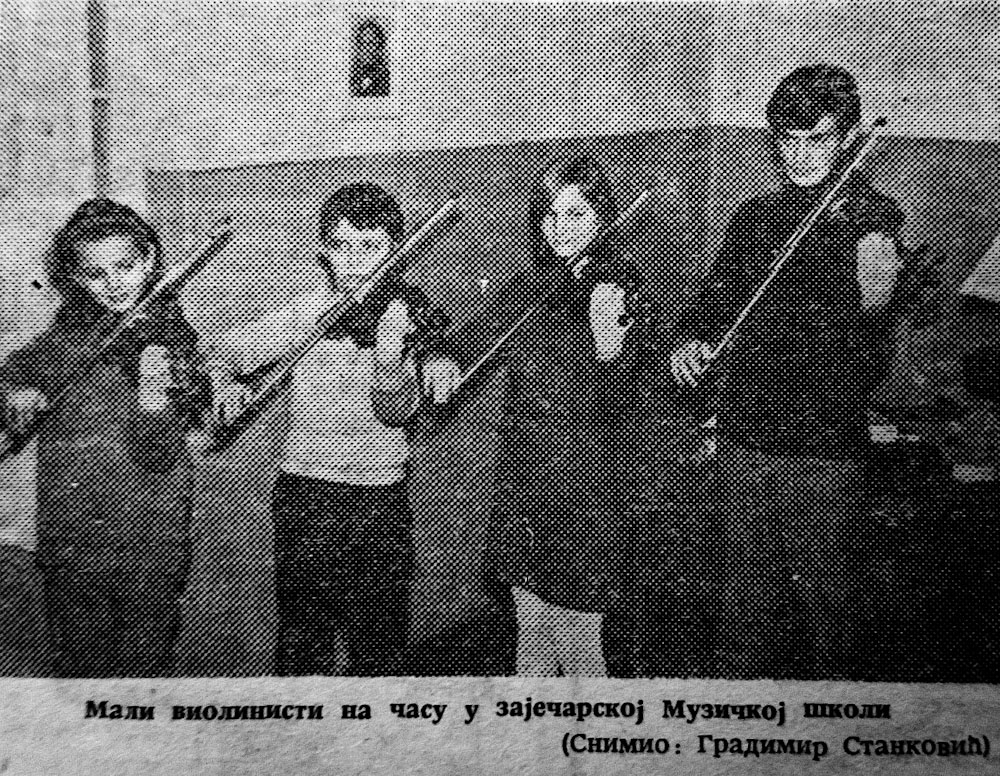
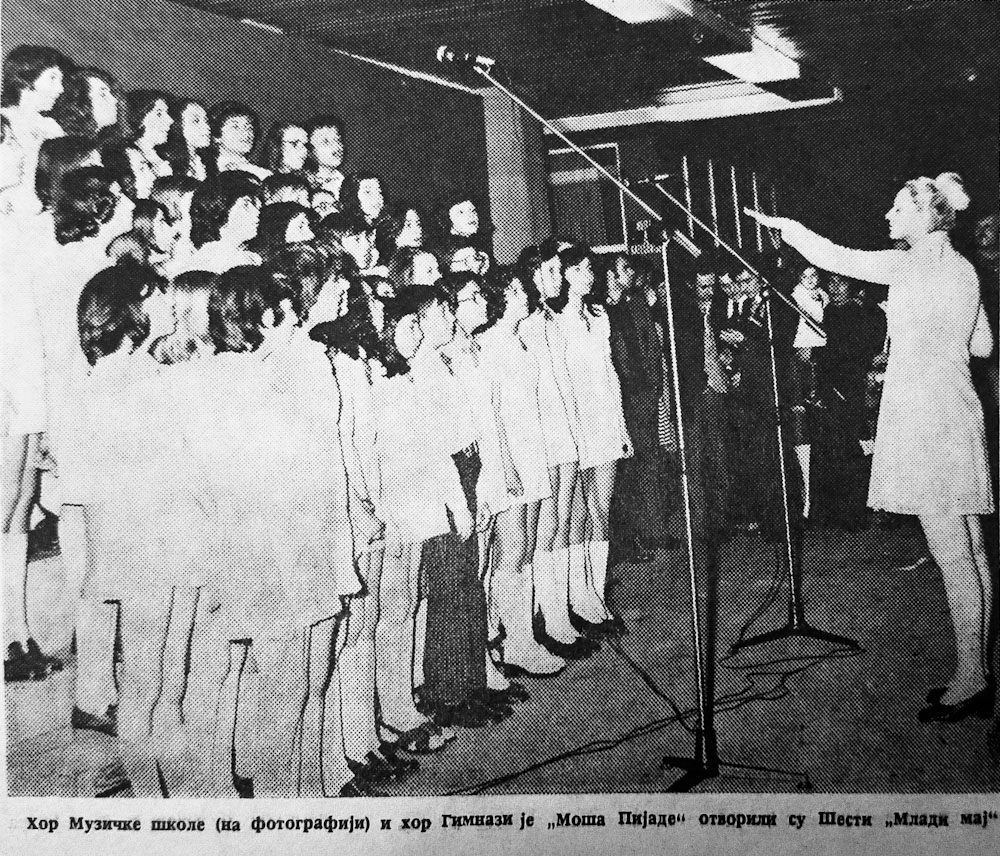
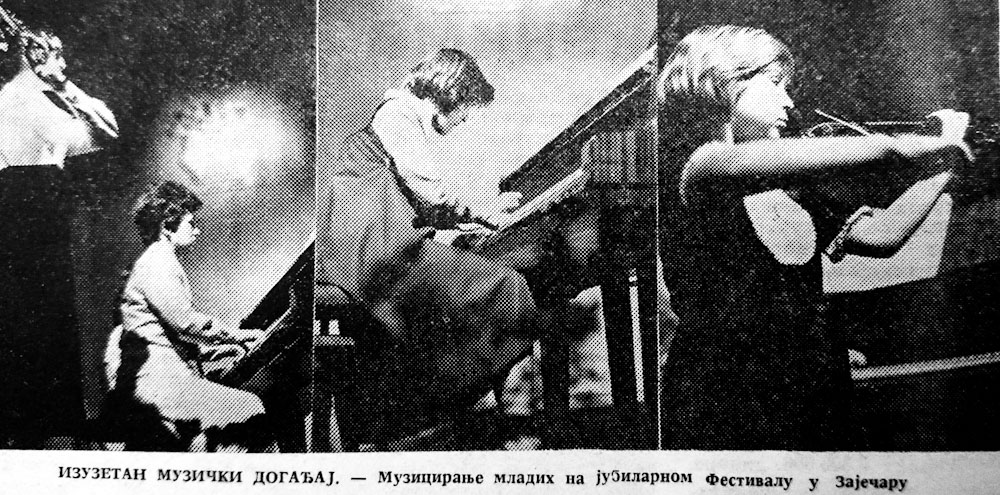
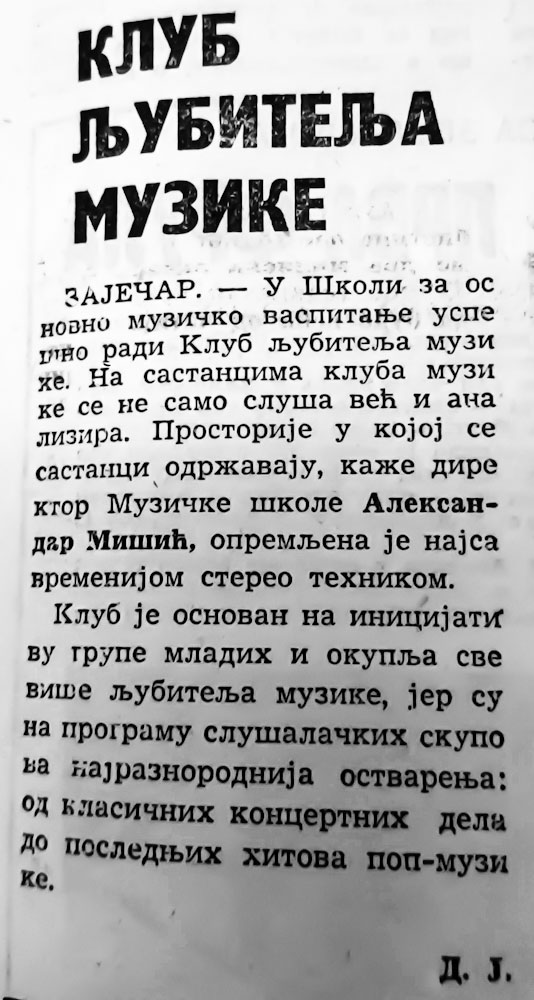
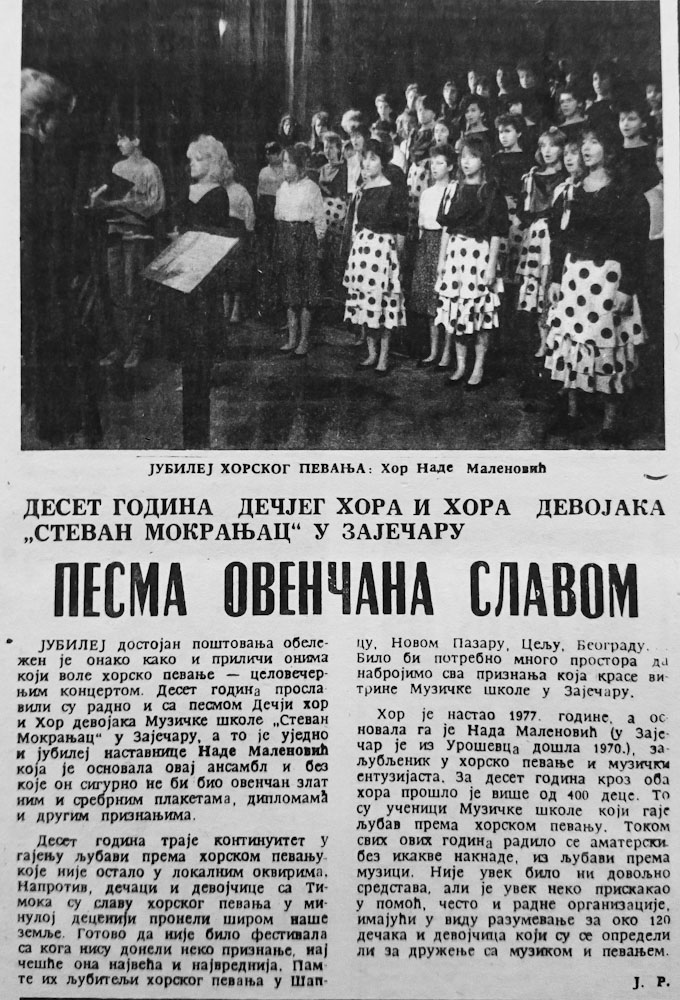
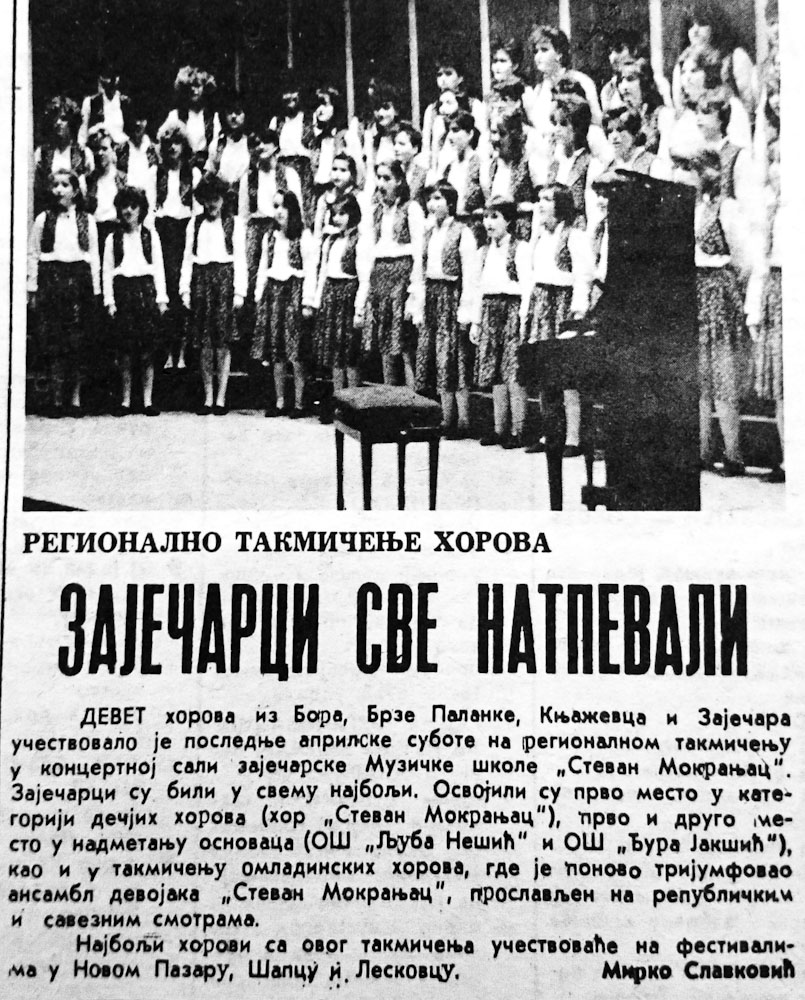
Today the Music School has around 250 students, and the classes are organized in 5 departments: piano, violin, accordion, guitar, and clarinet. The school has 17 classrooms spread over 777 square meters, of which 237 belong to the contemporary equipped Music Hall designed by the experts from the Faculty of Electrical Engineering in Belgrade. Students’ talents are being proven all the time, through numerous awards, international performances, and faculty studies in Serbia and abroad.
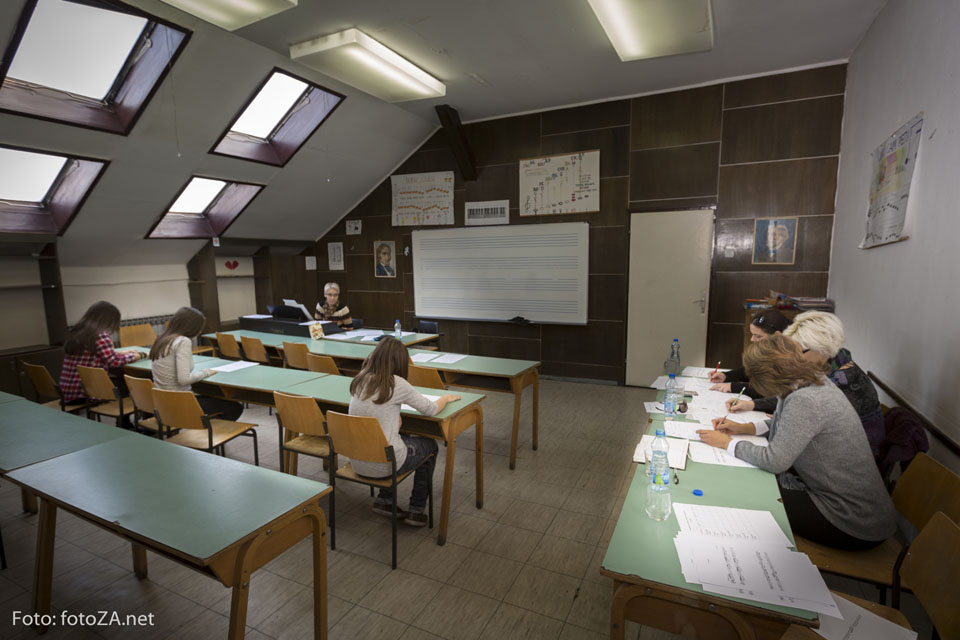
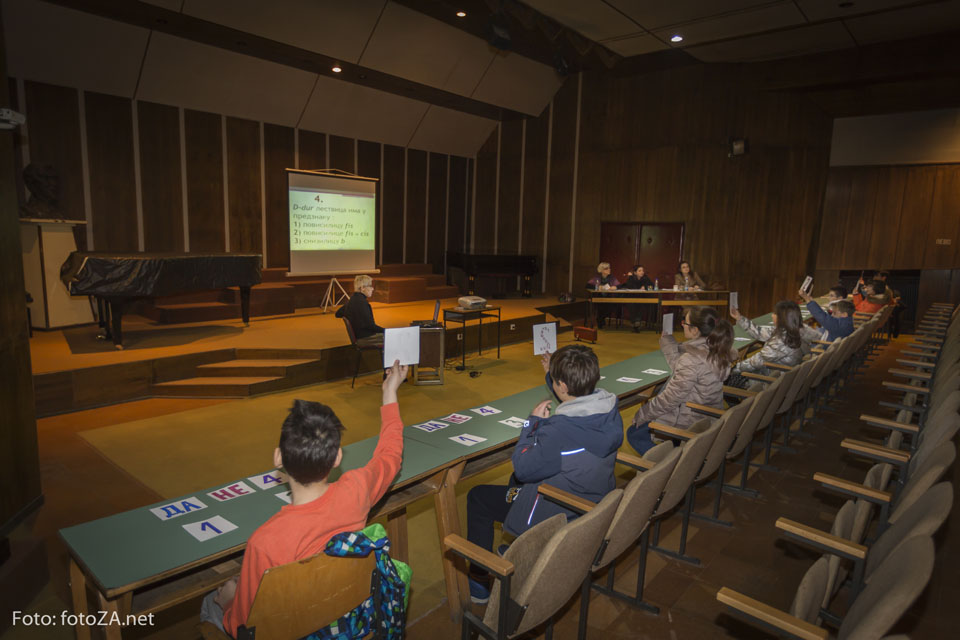
SOURCES:
Nada Velimirović, „Prva ženska gimnazija u Zaječaru“ (1906-1912). Razvitak 26/1986, br.6, str.69-74.
Žarko P. Milošević, Muzička škola „Stevan Mokranjac“ u Zaječaru 1948/49-2003/2004. Zaječar, 2004.
Žarko P. Milošević, Stanko J. Mitić, Osnovno školstvo Zaječara 1830-2003. Zaječar, 2006.
Official Website of “Jelena Majstorović” School: sosojelenamajstorovic.edu.rs
Official Website of the Music School: mokranjaczajecar.edu.rs
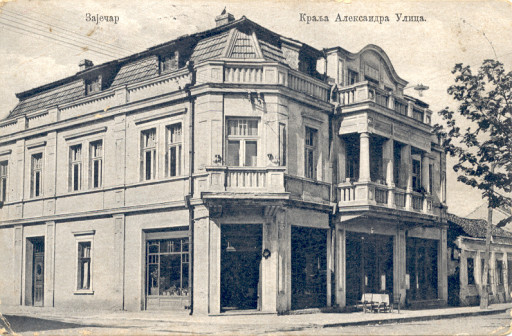
It was built in 1920s by the merchant Petar Nikolić – Kikirez and the upper floor was used as family...
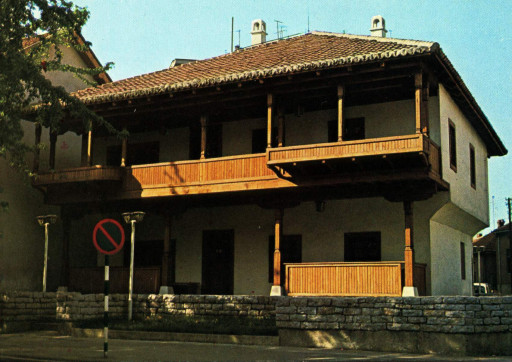
Reconstructed copy of one of the rare surviving examples of the Greek-Oriental house design in Timok...
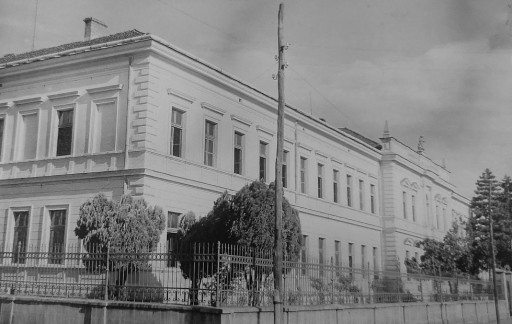
During its long history, it was a home to Zaječar Gymnasium (1893-1959), High School of Economics (1...
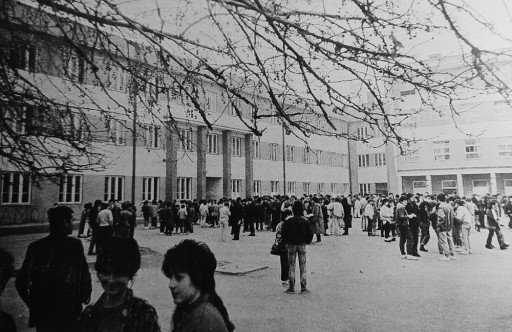
The School of Economics and Trade was founded in 1946 following the tradition of the former Trade Ac...